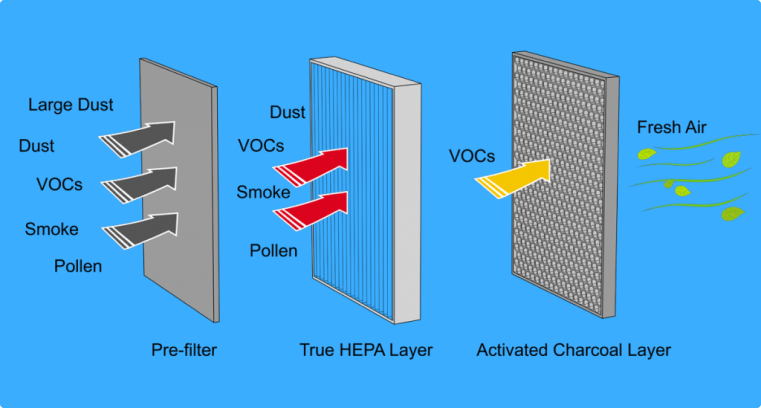No, not all air purifiers have HEPA filters. While HEPA filters are highly effective at removing small particles from the air, some air purifiers use alternative technologies to filter air.
For example, some air purifiers use activated carbon filters to remove odors and chemicals from the air. Other air purifiers may use electrostatic precipitators or ionizers to charge particles in the air and then collect them on plates or filters.
What is Hepa Filter?
A HEPA filter is a mechanical air filter that uses pleats. HEPA stands for “high-efficiency particulate air [filter]” and is officially defined by the U.S. Department of Energy.
This filter can potentially eliminate at least 99.97% of dust, pollen, mold, bacteria, and any airborne particles that are 0.3 microns (µm) in size. The diameter size of 0.3 microns corresponds to the worst-case scenario or the most penetrating particle size (MPPS). Larger or smaller particles are captured with even greater efficiency. Using the worst-case particle size leads to the worst-case efficiency rating, which means it can capture 99.97% or more of all particle sizes.
Necessary Things to have in Hepa filter
Air purifiers are required to have either a HEPA H13 or HEPA H14 filter. Generally, air purifiers consist of three types of filters: a pre-filter, an active carbon filter, and a HEPA filter.
The pre-filter captures large dust particles, whereas the active carbon filter removes odors from the air. The most crucial filter among the three is the HEPA filter, which captures smaller particles that the pre-filter cannot capture. With the ability to remove particles as small as 0.1μm, the HEPA filter is instrumental in removing harmful elements and performing the majority of air purification.
What is True Hepa?

For a HEPA filter to meet certification requirements, it must attain a rating of MERV 17 or higher. This denotes that the filter can trap 99.97% of particles that are 0.3 microns or larger in size. In contrast, a MERV 5 or 6 filter is less efficient, capturing less than 20% of particles that are larger than 10 microns in size.
FAQ’s
What is a MERV rating?
MERV stands for Minimum Efficiency Reporting Value, which is a rating system used to determine the effectiveness of air filters. It measures the filter’s ability to capture particles of varying sizes, ranging from 0.3 to 10 microns. The MERV rating ranges from 1 to 20, with a higher number indicating a higher level of filtration efficiency.